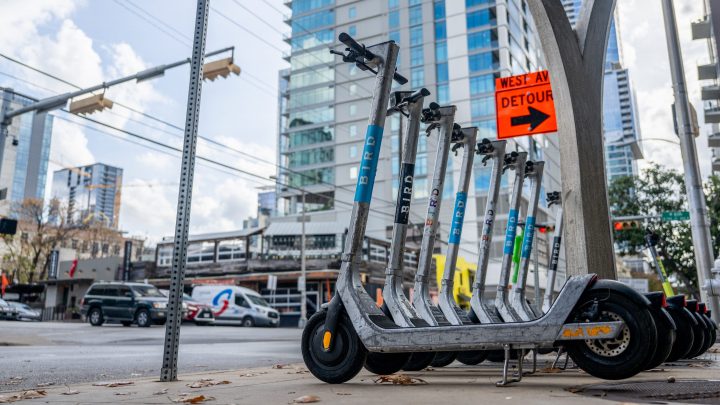
E-scooter firms set out to revolutionize transportation. Instead, many are collapsing.
E-scooter firms set out to revolutionize transportation. Instead, many are collapsing.

There was a time — about five years ago — when electric scooters started showing up in cities all over the U.S. and around the world. You could use an app to rent one for a few minutes or a few hours, and when you were done, you could just leave it wherever.
Some people claimed they’d be an important part of urban mobility. Others hated them, mostly for their tendency to end up dumped in the middle of sidewalks.
The companies that offered them got a lot of venture capital money. And one of them — Bird — was one of those pre-pandemic “unicorn” companies that didn’t take long to be worth $1 billion and up.
But now, the industry’s not looking so good. Companies have pulled out of cities, others have had rounds of layoffs. And just this week, Bird filed for bankruptcy.
So what went wrong? And is there any life left in the so-called “micro-mobility” industry?
Bird and companies like it made a pretty good case for e-scooters in the late 2010s, says Ralph Buehler, a professor of Urban Affairs and Planning at Virginia Tech.
“The e-scooter can facilitate trips that are a little bit too long to walk, but there’s no bus or no subway to take you there easily,” he said.
Plus, a lot of people thought they were fun to ride. But others thought they were fun to vandalize or throw into rivers. And because they didn’t have docking stations, they just kinda ended up all over the place.
But the companies behind them were backed by lots of venture capital, says David Zipper at the Harvard Kennedy School.
“They would sort of show up in cities uninvited and basically begged for forgiveness rather than permission to operate,” he said.
Zipper says they were just doing what Uber and Lyft had done a few years prior. But in the case of scooters, it backfired. And cities started regulating them with equity requirements or rules about where the scooters could and could not be used, he said.
Then the pandemic delivered the industry a blow, though it did rebound in 2021.
But there were other problems, says Juan Matute at the UCLA Institute of Transportation Studies. For one, people noticed they got a lot cheaper.
“They would just say, ‘Oh, I’ll just buy the scooter. And then I’ll always have it available. And then I don’t have to be worried about the brakes not working or it not being charged,'” he said.
Then, as interest rates rose, the VC money dried up.
The industry hasn’t completely imploded. Lime, one of the bigger players in the sector, claims it’s profitable and has flirted with going public.
But if e-scooter rental companies are going to be a thing in the long run, their business model needs to change, says Melinda Hanson of Brightside Strategies and the former head of sustainability at Bird.
“It needs to be viewed as a form of transit and not just a, you know, rogue VC project,” she said.
Hanson says that means it’ll need public funding and infrastructure like other forms of transportation.
There’s a lot happening in the world. Through it all, Marketplace is here for you.
You rely on Marketplace to break down the world’s events and tell you how it affects you in a fact-based, approachable way. We rely on your financial support to keep making that possible.
Your donation today powers the independent journalism that you rely on. For just $5/month, you can help sustain Marketplace so we can keep reporting on the things that matter to you.
















